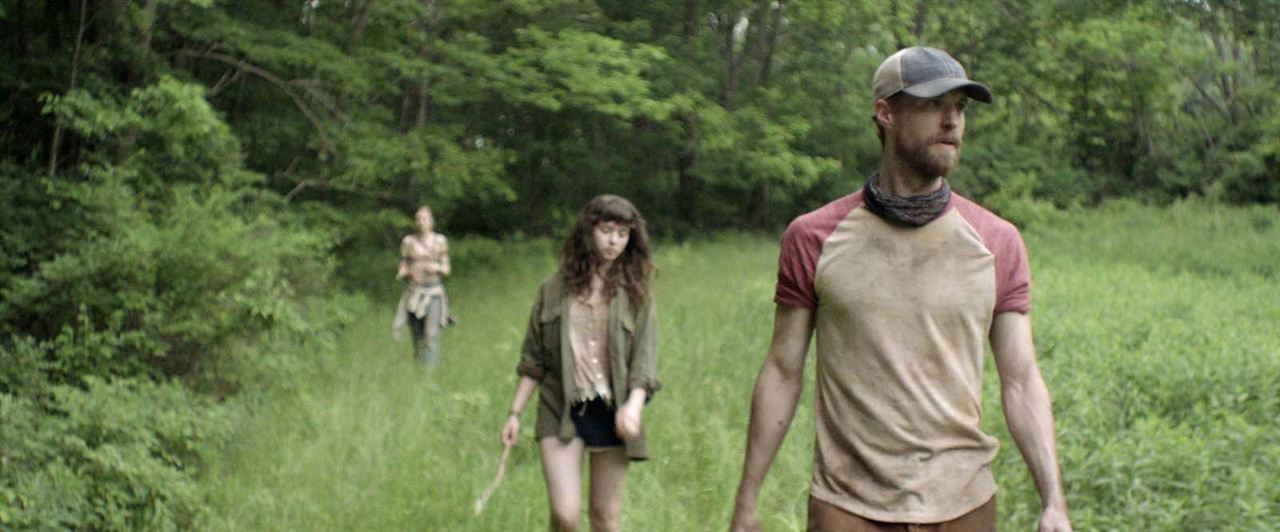In a genre saturated with loud explosions, fast zombies, and chaotic end-of-the-world scenarios, Here Alone (2016) is a rare, haunting gem. Directed by Rod Blackhurst, this indie post-apocalyptic film doesn’t scream. It whispers — and the echo lingers long after the credits roll.
Set in a world ravaged by a mysterious virus that turns people into feral, zombie-like beings, Here Alone strips the horror genre down to its emotional bones. It is a story of grief, isolation, survival, and guilt, with more silence than screams — and more humanity than horror.
The plot centers on Ann (played brilliantly by Lucy Walters), a lone survivor living in the wilderness after civilization has collapsed. The infection spread quickly, and the world crumbled in its wake. Ann now spends her days scavenging for supplies, hiding from the infected, and replaying memories of a family she couldn’t save.
Unlike most zombie films, Here Alone is not concerned with action-packed sequences or military intervention. The threat here is both external and internal. The infected are terrifying, but so is Ann’s crushing loneliness. Her pain is not loud, but suffocating — and all the more believable because of it.
This is survival horror without the bombast. There are no heroes here, just broken people trying to survive one more day.
Shot in upstate New York with a sparse, grey-toned palette, the film is a masterclass in environmental storytelling. The forest becomes a character itself — equal parts sanctuary and prison. The soundtrack is minimal, allowing nature’s ambient sounds to dominate: the rustle of leaves, the snap of a twig, the quiet terror of waiting.
The cinematography mirrors Ann’s psychological state: distant, meditative, and always tense. She paints her face with mud to hide her scent. She sets tripwires. She eats canned food in silence. Her life is a ritual of survival — but also of punishment.
Flashbacks offer fragments of how she came to be alone. We see glimpses of her husband and baby daughter, and slowly, the heartbreak unfolds. These sequences are tender, warm, and tragically short — a stark contrast to her bleak present.
The film’s emotional center deepens when Ann encounters Chris (Adam David Thompson) and Olivia (Gina Piersanti), a father and teenage daughter struggling to survive on their own. At first, there’s hesitation and fear. But eventually, survival instincts give way to fragile trust.
Ann begins to open up — even smile — but also wrestles with guilt and jealousy. Olivia represents a younger version of herself, perhaps a second chance. Chris, kind but wounded, becomes a subtle emotional anchor. But the bond they share is delicate, and in a world this broken, nothing lasts forever.
What makes these relationships compelling is how real they feel. There are no grand speeches, no dramatic standoffs. Just quiet moments, painful truths, and the unspoken understanding that safety is always temporary.
Here Alone may be about a viral apocalypse, but it is truly a study of grief, guilt, and the need for connection. Ann’s isolation is both physical and emotional. She punishes herself daily for the loss of her family, clinging to life not because she wants to live — but because she feels she doesn’t deserve to die.
Survival, in this context, is not noble. It is exhausting. Every meal, every shelter, every decision is laced with fear and regret. The film dares to ask: What’s left of us when there’s no one left to love?There are no easy answers. Only quiet tragedy.
Lucy Walters delivers a career-defining performance as Ann. With minimal dialogue, she conveys deep pain, resilience, and vulnerability. Every facial twitch, every pause, speaks volumes.

Rod Blackhurst’s direction is deliberate and patient. He resists genre clichés in favor of emotional storytelling. The infected, while ever-present, are not the real monsters. Loneliness is. Regret is.The film won the Audience Award at Tribeca Film Festival, a testament to its powerful resonance despite its quiet nature.
Here Alone is not for everyone. It’s slow, meditative, and unafraid of stillness. But for those willing to sit with it, the film offers a rare cinematic experience — one that places humanity above horror, emotion above spectacle.
In a world obsessed with loud survival, Here Alone shows us the quieter truth: sometimes the hardest battle is not against the infected, but against ourselves.If you've ever wondered what survival feels like, rather than just what it looks like — this is the film for you.





-1751533077-q80.webp)
